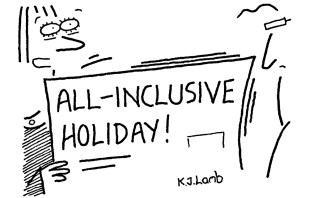If being asked to write music for the coronation of a king is an honour, then doing it for an emperor is even more so, you might think. That was certainly the view of Jean-François Le Sueur (1760-1837), an opera composer who was made director of music at Notre-Dame by Napoleon. At the self-coronation of the ‘Emperor of the French’ in 1804, two choirs and orchestras performed pieces by Le Sueur, who dined out on it for the rest of his life.
Fortunately for him, the French authorities, perhaps keen to forget the vulgar spectacle, never got round to clarifying who wrote what. So, years later, Le Sueur gilded the lily: he lumped together all the coronation music, including a Mass and Te Deum by the safely dead Paisiello, into an ‘oratorio’ under his own name, implying that he’d written everything. The truth didn’t emerge until the early 20th century.
The Emperor served 24,000 bottles of champagne and specially prepared meat. Human meat, possibly
On the other hand, not every composer of imperial music has wanted to capitalise on it. For example, a piece entitled La Marche Du Sacre De S.M. L’empereur Bokassa 1er barely features in its composer’s discography, despite being written for the most extravagant imperial coronation of the 20th century, at which the emperor, flanked by guards in Napoleonic uniforms, sat on a bronze throne weighing two tons and then threw a banquet at which guests were served 24,000 bottles of champagne and specially prepared meat.
Human meat, possibly. The ‘emperor’ was Jean-Bédel Bokassa, who occupied the throne of the Central African Empire from 1977 until his overthrow in 1979, when his country reverted to its old name of Central African Republic. Bokassa was rumoured to be an enthusiastic cannibal who enjoyed serving human remains to unsuspecting visitors including his ally President Giscard, who wasn’t at the coronation but sent one of his ministers dressed as the Napoleonic commander Marshal Ney.
‘The March of the Emperor’ was issued as a seven-inch single, which credits it to one Jean Musy. That makes sense: Bokassa insisted on the best, roping in Pierre Cardin for his coronation suit and spending $72,000 on his empress’s Lanvin dress. Musy was a hip young composer and arranger of pop songs and film scores. He was musical director of France’s 1975 Eurovision entry and in 1980 orchestrated Charles Aznavour’s hit song ‘Une vie d’amour’. You can hear his Bokassa piece on YouTube, where the composer is named as Olivier Brice – a mistake, surely, since Brice (1933-89) was the once-fashionable sculptor who blew up his career by creating Bokassa’s throne.

The imperial march, which was played as Bokassa entered the cathedral of Notre-Dame de Bangui and also at the moment when the emperor – you guessed it – crowned himself. (He’d planned to snub Pope Paul VI just as Napoleon snubbed Pius VII, but the elderly pontiff smelled a rat and excused himself.) Yet it’s undeniably catchy: woodwind trilling over snare drums until, halfway through, a synthesiser and wordless choir add a touch of mid-1970s class.
I don’t blame Musy, who’s now 75 and one of the grand old men of French light music: he wasn’t to know that Bokassa allegedly clubbed children to death. He was asked for a soundtrack for a bizarre spectacle in Central Africa and he delivered the goods, just as he has on 928 other occasions, according to the Discogs database. Bokassa wanted to recreate the 1804 coronation and Musy did his homework. You hear the same jaunty dotting of the flutes in Le Sueur’s march for the entry of Napoleon; the resemblance seems to close to be coincidental. At any rate, both composers knew what the client wanted.
This isn’t to imply that composing for royal events is easier than writing abstract music. Ask the Dutch-British composer John Ewbank, who in 2013 wrote the official anthem for the swearing-in of King Willem-Alexander of the Netherlands (where they don’t do coronations). He had to withdraw it after 38,000 people threatened to resign their Dutch citizenship in protest at the ‘imbecilic’ North Korean-style lyrics, which had the new king promising to ‘build a dyke with my bare hands and keep the water away’. The music was no better: a hideous confection of folk music and rap.
As for our own coronation, I’m writing this before the event, so I’ll hang fire and wish the best of luck to the composers. Unlike Napoleon and Bokassa, the King has sophisticated musical tastes and I’m not convinced that the demographically adjusted fare provided for the ceremony is the sort of thing he enjoys. In which case, knowing him, we may hear about it. Also, one of the conductors on Saturday is his long-time musical mentor Sir John Eliot Gardiner, whose displeasure in rehearsals has been known to verge on the Bokassian. So, as I say, best of luck.
Join The Spectator's Fraser Nelson, Katy Balls and guest Camilla Tominey from the Daily Telegraph for a special edition of Coffee House Live covering what kind of monarch Charles III will be, and whether the coronation will distract voters from the Tories’ predicted heavy losses in the local elections. 10 May from 7pm. Book your tickets today: spectator.co.uk/coronation








Comments